#Sir John Kerr
Explore tagged Tumblr posts
Text
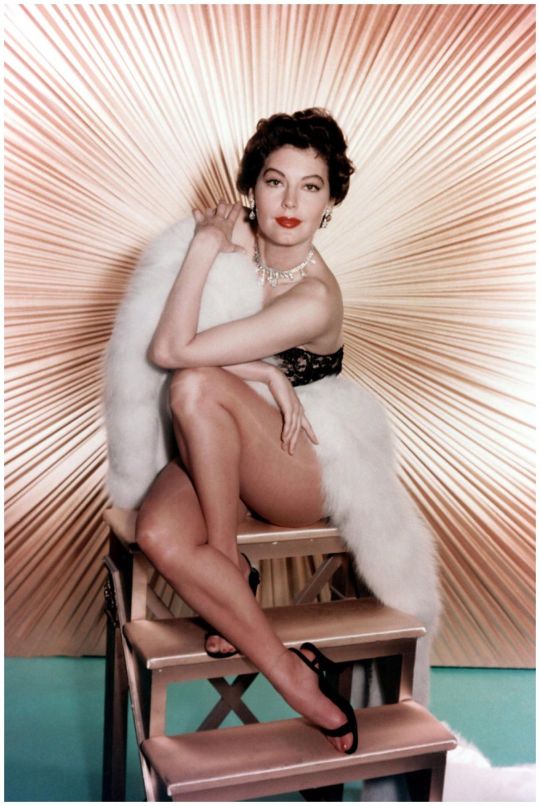
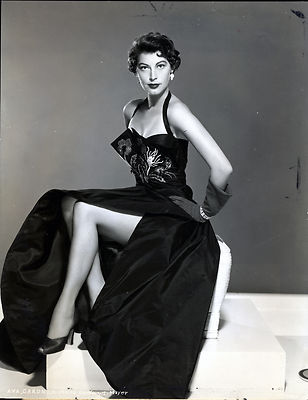
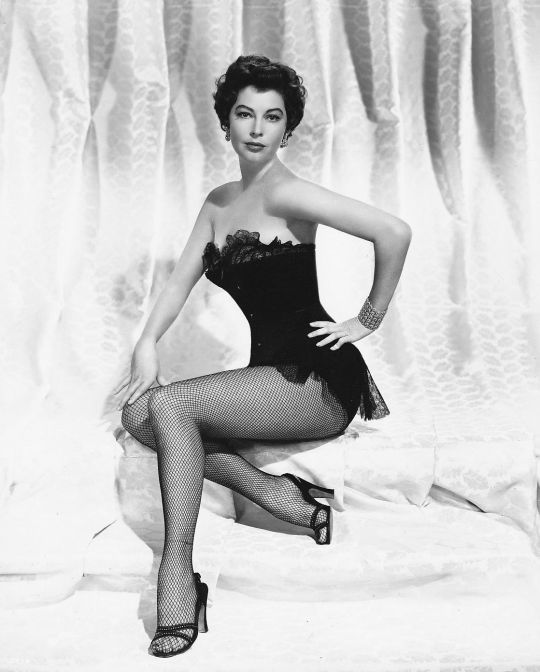
Films from the next decade or so include The Hucksters (1947), Show Boat (1951), The Snows of Kilimanjaro (1952), Lone Star (1952), Mogambo, nominated for a Best Actress Academy Award (1953), The Barefoot Contessa (1954), Bhowani Junction (1956), The Sun Also Rises (1957) and On the Beach (1959). Off-camera, she could be witty and pithy, as in her assessment of director John Ford, who directed Mogambo ("The meanest man on earth. Thoroughly evil. Adored him!"). In The Barefoot Contessa, she played the role of doomed beauty Maria Vargas, a fiercely independent woman who goes from Spanish dancer to international movie star with the help of a Hollywood director played by Humphrey Bogart, with tragic consequences. Gardner's decision to accept the role was influenced by her own lifelong habit of going barefoot. Gardner played the role of Guinevere in Knights of the Round Table (1953), with actor Robert Taylor as Sir Lancelot. Indicative of her sophistication, she portrayed a duchess, a baroness and other women of noble lineage in her films of the 1950s.
Gardner played the role of Soledad in The Angel Wore Red (1960) with Dirk Bogarde as the male lead. She was billed between Charlton Heston and David Niven for 55 Days at Peking (1963), which was set in China during the Boxer Rebellion in 1900. The following year, she played her last major leading role in the critically acclaimed The Night of the Iguana (1964), based upon a Tennessee Williams play, and starring Richard Burton as an atheist clergyman and Deborah Kerr as a gentle artist traveling with her aged poet grandfather. John Huston directed the movie in Puerto Vallarta, Mexico, insisting on making the film in black-and-white – a decision he later regretted because of the vivid colors of the flora. Gardner received billing below Burton, but above Kerr. She was nominated for a Golden Globe Award for Best Actress in a Motion Picture – Drama and BAFTA Award for Best Actress in a Leading Role for her performance.
55 notes
·
View notes
Text
BRF Reading - 10th of March, 2024
This is speculation only
Cards drawn on the 10th of March, 2024
Question: Did King Charles ever plan to 'give' the Commonwealth Realms to one of his sons in some way?

Interpretation: Very possibly
Card One: The High Priestess
The energy of this card is of hidden secrets that have yet to be revealed. The card shows Persephone as Queen of the Underworld, the place where secrets are hidden, blocking the path to the daylight world so the secrets can not escape and be revealed. The energy is very strongly of secrets, things that are hidden and are not yet ready to be revealed.
This is very frustrating for me as an answer to my question because I wanted to know!
Card Two: The Seven of Wands
This is a card of arguments, strife, and holding your ground. It tells me that there have been arguments about this behind the scenes, but not what the arguments were about. The energy is of someone being stubborn in the face of opposition - like X is saying "you can have M and I will give N to someone else' and the person is saying 'No, I want N", or as if a person is being told No but they are persisting in their idea and trying to find a way to make the No a Yes. It is very much an energy of standing your ground on an idea and not backing down or giving it up.
Wands are the suit of PR, and I have bits from media reports to throw into the mix (sorry these are all Australian):
At one time King Charles, then the Prince of Wales, offered to be Governor-General of Australia and was turned down by the then Prime Minister, Bob Hawke (PM from 1983 to 1991). Charles said about this later "So, what are you supposed to think when you are prepared to do something to help and you are just told you're not wanted?''
As background to this, in 1976 there was a letter from the royal household to the then Governor-General of Australia, Sir John Kerr, stated that the Queen did not want Prince Charles to be Governor General until he had a 'settled married life'. So the topic was raised by the Australian Government at that time.
Both Prince William and Prince Harry apparently expressed an interest in being the Governor General of either Australia or Canada in 2009. It was reported that the princes "would give very serious consideration" to the offer if it was made to them, which obviously did not happen.
Card Three: The Sun
The Sun is a very positive and optimistic card. In answer to a yes/no question it means yes. It is a card of success, confidence, and truth. The picture on the card is of the god Apollo, the favoured child of the ruler of the gods, Zeus. "Sun" also sounds the same as "son". All these things taken together tell me that yes, there was an idea of turning over the Commonwealth Realms to one of King Charles's sons in some way - maybe by having him as Governor-General of one or more realms, maybe in another way. The exact details are in those secrets being guarded by the High Priestess. :)
The energy of this card is that of the golden child, the favoured son, the one who can do no wrong. That energy tells me that if this idea/plan was successful, then the position would go to whoever was the favoured child of King Charles at that point in time.
Underlying Energy: The Lovers
This is a card of choices, relationships, balance, and unity. The energy here is of partnerships - those within King Charles and his family, and those between the Realms of the Commonwealth and Great Britain. I feel that it was important that nothing was done to disrupt the relationships between the Commonwealth Realms and Great Britain, so the bestowing of a realm on one or both of the sons of the Prince of Wales (as he was then) could only be done with the approval of the government of that realm, and that was not forthcoming. It's all about people being able to choose their own government, King Charles wanted to choose a realm for each of his sons, and the delicate balance that maintains the partnership between the people of the realm, their government, and their relationship with the Royal Family and their official Head of State.
Conclusion:
The details are secret and are not yet ready to be revealed, but it looks like there was an attempt by King Charles to 'gift' a Commonwealth Realm to each of his sons, or to 'gift' all of the Commonwealth Realms to one son. This idea would disturb the balance between the people of the realm, their government, and their head of state (the monarch of Great Britain), and so has not yet eventuated.
34 notes
·
View notes
Text




December 13th 1585 saw the birth of William Drummond of Hawthornden, the noted Scottish poet.
Drummond was born at Hawthornden Castle, near Bonnyrigg, Midlothian, the eldest son of Sir John Drummond, Laird of Hawthornden. The Drummonds were an ancient family with connections to the Royal House of Stewart. Drummond was educated at the High School of Edinburgh, then at Edinburgh University, graduating MA in 1605. From 1606 to 1608 he studied Law in Paris and Bourges. When he returned to Scotland in November 1608, he bought back nearly 400 volumes of French, Italian, Spanish, and English literature, the foundation of a fine private library. In 1610, Drummond visited London, meeting some of the most famous poets of the city. Upon his father’s death later that year, Drummond became Laird of Hawthornden and retired to the family seat, to write and to lead a life of "gentlemanly simplicity". It's alright if you have the money eh!
Drummond has long enjoyed a reputation as Scotland’s foremost seventeenth-century poet. He wrote in English, not Scots, and is regarded as playing a major role in the Anglification of Scottish literature. As his poetic reputation grew, he began to correspond with the Scottish poets at the Court of King James VI and I: Robert Kerr, Sir Robert Aytoun, Sir David Murray, and, particularly, William Alexander of Menstrie.
When James VI made his only return to Scotland in 1617, Drummond saluted him with Forth Feasting: A Panegyricke to the Kings Most Excellent Majestie. This led to Drummond’s work becoming more widely known in London literary circles. Ben Jonson, on a visit to Scotland, stayed at Hawthornden Castle in 1618, and Drummond recorded their conversations. In 1623, Drummond was deeply affected by the loss of his mother and the death of many friends in a famine that afflicted Scotland. His grief was expressed in his next volume Flowres of Sion, a collection of religious and philosophical lyrics.
In 1626, Drummond was made a burgess of Edinburgh and in the same year made a major donation of books to Edinburgh University Library. His gift of around 550 volumes made him the Library's first significant private benefactor and gave the Library it's first literary collection. Drummond made further donations on an annual basis between 1628 and 1636. All in all, he presented some 800 printed titles and thirty-six manuscripts; around 700 volumes survive in the Library’s collection. These include some of the Library's greatest treasures, especially in the fields of literature, history, geography, philosophy and theology, science, medicine and law. They include early printings of Shakespeare, Jonson, Spenser, Drayton and Sir Philip Sidney, a complete copy of John Derrick's Image of Irelande from 1581!
By 1633, Drummond had resumed his literary career, writing a series of pageants for the Scottish coronation of Charles I. From the mid-1630s onwards, however, Drummond’s energies turned to political pamphleteering. His first overly political work was a defence of John Elphinstone, Lord Balmerino, who was convicted on a capital charge of libel against the King for possessing a document thought to be treasonable.
He also got involved with The National Covenant, although opposed to the infamous prayer book, rather than the taking of arms which blighted Scottish history he advocated passive obedience to the King. Further pamphlets attacked the Presbyterian grip on the country and warned of the consequences of civil war.
Drummond played no personal role in the Bishops’ Wars of 1639 and 1640, and in the civil conflicts that rocked England and Scotland over the following decade. His last substantial tract was Skiamachia, or, A Defence of a Petition in 1643, in which he assumed an extreme anti-clerical position.
Drummond died at Hawthornden Castle on 4 December 1649. Drummond’s son William and brother-in-law collaborated the posthumous printing of much of Drummond’s work.
The wooded solitude Drummond enjoyed at Hawthornden still exists to this day and is an international retreat for writers at Hawthornden Castle has been founded to provide a peaceful setting where creative writers can work without disturbance. To me though, below the cliff it sits on above the River Esk, is the interesting bit, Wallace's Cave, a large rock cavern with a neatly chiseled doorway said to be where our favourite Freedom fighter used at the time of the Battle of Roslin, which took place nearby in 1303.
8 notes
·
View notes
Text









Pink Dresses in Oil Paintings (details)
Sir Nathaniel Dance-Holland, The Pybus family, c. 1769
John Singleton Copley, Young Lady with a Bird and a Dog, c. 1767
Edward Hughes, Juliette Gordon Low, c. 1887
Antonio Cabral Bejarano, A Bolero Dancer, c. 1842
Jean-Honoré Fragonard, Blind-Mans Buff, c. 1750/1752
Gustav Klimt, Sonja Knips, c. 1897/1898
Charles H. M. Kerr, The Rose Coloured Gown (Miss Giles), c. 1896
James Tissot, Portrait of the Marquise de Miramon, née Thérèse Feuillant, c. 1866
Frédéric Bazille, The Pink Dress, c. 1864
#oil painting#oil on canvas#details#Impressionism#pink#18th century art#19th century art#19th century fashion#18th century fashion#pink dress#fashion
10 notes
·
View notes
Text
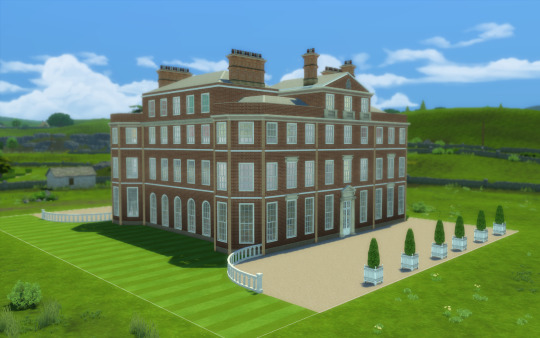



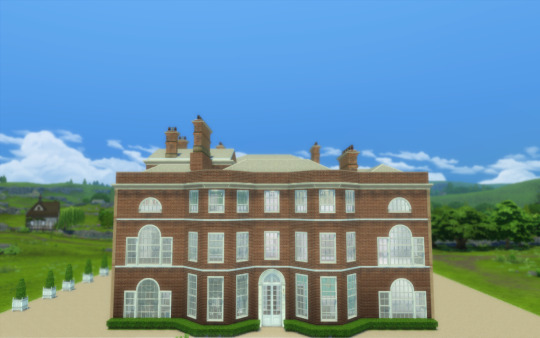


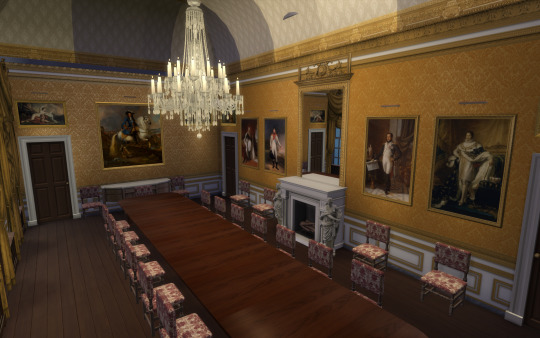




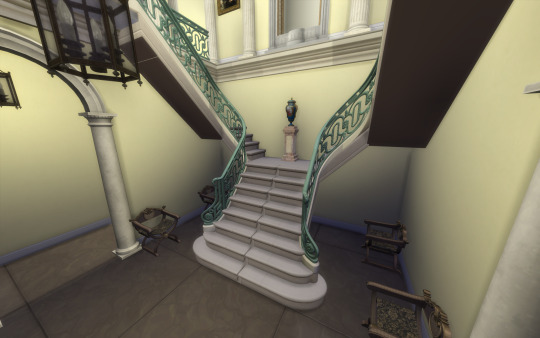
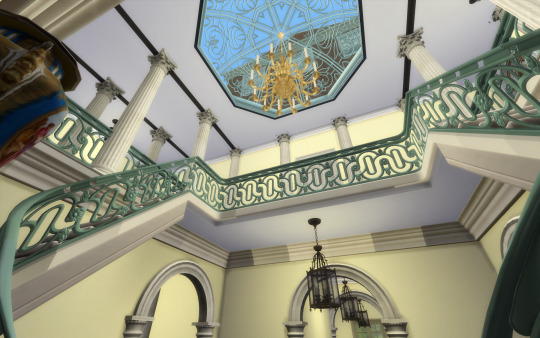







Brocket Hall
Nueva
Hace un instante
Hi guys!!
I'm sharing Brocket Hall. This is the 22nd building for my English Collection!
I decorated some of the house ground floor, for reference.
History of the house:
Brocket Hall is a neo-classical country house set in a large park at the western side of the urban area of Welwyn Garden City in Hertfordshire, England.
On the parkland site were two predecessors: the first of these was built in 1239 as Watership or Durantshide Manor, and was early held variously of Hatfield Manor and the Bishop of Ely. A second predecesor was built about 1430: whereas in 1413 John Mortimer had held Waterships, it is known that in 1477 Thomas Brockett held both manors. The house was acquired by John Brocket in the early 1550s, and passed to his son Sir John Brocket (captain of the personal guard of Queen Elizabeth) on his death in 1558.
The building and park owe much of their appearance today to Sir Matthew Lamb, 1st Baronet, who purchased the estate in 1746 and commissioned Brocket Hall to the designs of the architect Sir James Paine in around 1760.
The next owner was William Lamb, 2nd Viscount Melbourne, who was Queen Victoria's first Prime Minister (1835–41). She often visited during this period. His wife, Lady Caroline Lamb, infamously had an affair with Lord Byron, causing Lord Melbourne much embarrassment. For one of his birthdays she held a state banquet in the Saloon, at which she had herself served from a large silver dish, naked.
On Lamb's death, the house passed to his sister Emily, whose second husband was another Prime Minister, Lord Palmerston. Palmerson died at Brocket Hall in 1865, the last UK prime minister to die in office.
On Emily's death, the hall then passed to Emily's grandson by her first marriage, Francis Cowper, 7th Earl Cowper, though it was his younger brother, Henry (d.1887), who lived at Brocket Hall.
In 1893, George Stephen, 1st Baron Mount Stephen, President of the Bank of Montreal and the first Canadian to be elevated to the Peerage of the United Kingdom, leased Brocket Hall from the 7th Earl for the remainder of his lifetime. Over the next three years, guests included the Queen's children: The Prince and Princess of Wales, The Duke and Duchess of Connaught and the Princess Mary, Duchess of Teck. In 1897, one year after his first wife died in 1896, Lord Mount Stephen married Georgina Mary (known as Gian) Tufnell, a Lady-in-Waiting to Princess Mary Adelaide, Duchess of Teck, who encouraged the match. Gian was a lifelong friend and confidante of the Duchess's daughter, Mary of Teck, the wife of King George V, and the Mount Stephenses regularly entertained the royal couple. Gian preferred life at Brocket Hall to the social life that surrounded their London residence at Carlton House Terrace. Lady Mount Stephen was a close friend of Georgina Gascoyne-Cecil, Marchioness of Salisbury, who lived on the neighbouring estate, Hatfield House.
After the death of the 7th Earl Cowper (1905), the underlying future reversion was left to his niece, but she died only a year after him (1906) and the estate passed to her husband, Admiral Lord Walter Kerr, who lived at Melbourne Hall. When the life tenant Lord Mount Stephen died in 1921, Kerr put the estate up for sale, and in 1923 it was purchased by Sir Charles Nall-Cain, who co-ran the brewing company Walker Cain Ltd; he was created Baron Brocket in 1933. His son, Ronald Nall-Cain, 2nd Baron Brocket, was a Nazi sympathiser; he was interned during the Second World War, and his property was sequestrated and put to use as a maternity hospital.
More history: https://en.wikipedia.org/wiki/Brocket_Hall
------------------------------------------------------------------------------
House file:
Location: Hatfield, England
Material: red brick
Style: Neo-classical
Date: 1760
This house fits a 50x40 lot.
I only decorated some of the important rooms. All the rest of the house is up to your taste to decor.
Hope you like it.
You will need the usual CC I use:
all Felixandre cc
all The Jim
SYB
Anachrosims
Regal Sims
King Falcon railing
The Golden Sanctuary
Cliffou
Dndr recolors
Harrie cc
Tuds
Lili's palace cc
Please enjoy, comment if you like the house and share pictures of your game!
Follow me on IG: https://www.instagram.com/sims4palaces/
@sims4palaces
Access only for memebers (free for all)
DOWNLOAD: https://www.patreon.com/user?u=75230453
#sims 4 architecture#sims 4 build#sims4#sims 4 screenshots#sims 4 historical#sims4building#sims4play#sims4palace#sims 4 royalty#ts4#ts4 download#ts4 simblr#ts4 gameplay#ts4 screenshots#the sims4#sims 4#sims 4 aesthetic#sims4 build#sims 4 gameplay#thesims4#the sims 4
17 notes
·
View notes
Text
Ah, des bons mots
1. "I am enclosing two tickets to the first night of my new play;
Bring a friend, if you have one."
George Bernard Shaw to Winston Churchill.
"Cannot possibly attend first night, I will attend the second...If there is one."
- Winston Churchill, in response.
2. A member of Parliament to Disraeli: "Sir, you will either die on the gallows, or of some unspeakable disease."
· "That depends, Sir," said Disraeli, "whether I embrace your policies or your mistress."
3. "He had delusions of adequacy." - Walter Kerr
4. "I have never killed a man, but I have read many obituaries with great pleasure."
- Clarence Darrow
5. "He has never been known to use a word that might send a reader to the dictionary."
- William Faulkner (about Ernest Hemingway).
6."Thank you for sending me a copy of your book; I'll waste no time reading it."
- Moses Hadas
7. "I didn't attend the funeral, but I sent a nice letter saying I approved of it."
- Mark Twain
8. "He has no enemies, but is intensely disliked by his friends.."
- Oscar Wilde
9. "I feel so miserable without you; it's almost like having you here."
- Stephen Bishop
10."He is a self-made man and worships his creator."
- John Bright
11. "I've just learned about his illness. Let's hope it's nothing trivial."
- Irvin S. Cobb
12. "He is not only dull himself; he is the cause of dullness in others."
- Samuel Johnson
13. "He is simply a shiver looking for a spine to run up."
- Paul Keating
14. "In order to avoid being called a flirt, she always yielded easily."
- Charles, Count Talleyrand
15. "He loves nature in spite of what it did to him."
- Forrest Tucker
16. "Why do you sit there looking like an envelope without any address on it?"
- Mark Twain
17. "His mother should have thrown him away and kept the stork."
- Mae West
18. "Some cause happiness wherever they go; others, whenever they go."
- Oscar Wilde
19. "He uses statistics as a drunken man uses lamp-posts... For support rather than illumination."
- Andrew Lang (1844-1912)
20. "He has Van Gogh's ear for music."
- Billy Wilder
21. "I've had a perfectly wonderful evening. But this wasn't it."
- Groucho Marx.
22."He has all the virtues I dislike and none of the vices I admire."
- Winston Churchill
30 notes
·
View notes
Text
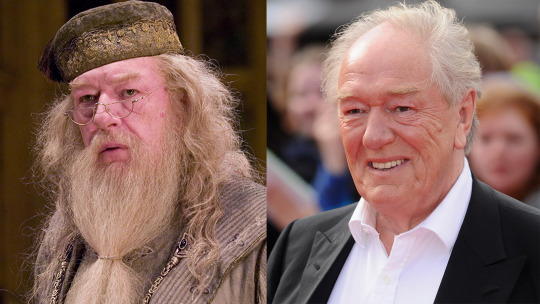
Sir Michael John Gambon CBE (/ˈɡæmbɒn/; October 19, 1940 – September 27, 2023) Film, stage and television actor. Gambon started his acting career with Laurence Olivier as one of the original members of the Royal National Theatre. Over his six-decade-long career, he received three Olivier Awards, two Screen Actors Guild Awards, and four BAFTA Awards. In 1998, he was knighted by Queen Elizabeth II for services to drama. Gambon enhanced his stardom through his role of Albus Dumbledore in the Harry Potter film series from 2004 to 2011, replacing Richard Harris following his death in 2002.
For his work on television, he received four BAFTA Awards for The Singing Detective (1986), Wives and Daughters (1999), Longitude (2000), and Perfect Strangers (2001). He also received two Primetime Emmy Award nominations for Path to War (2002) and Emma (2009). Other notable projects include Cranford (2007) and The Casual Vacancy (2015). In 2017, he received the Irish Film & Television Academy Lifetime Achievement Award.
In 1967, he made his television debut in the BBC television adaptation of Much Ado About Nothing as Watchman No. 4. He also appeared in British programmes such as Softly, Softly (1967), and Public Eye (1968). From 1968 to 1970, he featured in the BBC historical series The Borderers as Gavin Kerr. He also had a recurring role in the Canadian series The Challengers (1972). He also appeared in drama anthology series including Play for Today, Play of the Month, and ITV Playhouse.
His craggy looks soon made him into a character actor. For his lead role in Dennis Potter's The Singing Detective (1986) he won his first British Academy Television Award for Best Actor. He starred as detective Inspector Jules Maigret in an ITV adaptation of twelve of Georges Simenon's books. In 1990, he played Jerry in Harold Pinter's Betrayal for BBC Radio 3. In 1991, he starred as Tommy Hanbury in an episode of the ITV series Minder called "Look Who's Coming To Pinner". He also appeared in the BBC serial Wives and Daughters (1999) based on the Victorian novel by the same name by Elizabeth Gaskell. He portrayed Squire Hamley and received his second BAFTA Award nomination and win for Best Actor. (Wikipedia)
IMDB Listing
#Sir Michael Gambon#TV#Obit#Obituary#O2023#The Singing Detective#Wives and Daughters#Longitude#Emma#Cranford#Path to War#Maigret
10 notes
·
View notes
Text

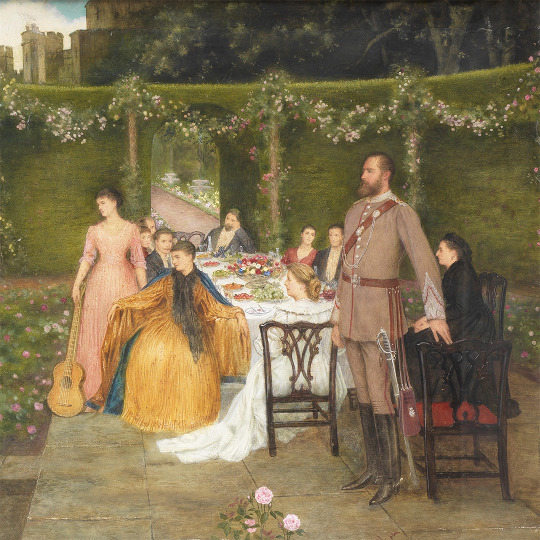
Edward Clifford, details from A Lunch Party at Ashridge House (1892). Sitters identified below.

Rt Hon. John ‘Yvo’ Vesey, 4th Viscount de Vesci (1844-1903), husband of (3)
Colonel Hon. Sir Reginald Chetwynd-Talbot (1841-1929), husband of (4), brother of (5, 7, 12, 14, 16)
Viscountess de Vesci (née Lady Evelyn Charteris) (1849-1939), wife of (1)
Margaret, Lady Chetwynd-Talbot (née Stuart-Wortley) (?-1937), wife of (2)
Countess Brownlow (née Lady Adelaide Chetwynd-Talbot) (1844-1917), wife of (15), sister of (2, 7, 12, 14, 16)
Miss Pamela Wyndham (later Baroness Glenconner; Viscountess Grey) (1871-1928), daughter of (10)
Hon. Alfred Chetwynd-Talbot (1848-1913), brother of (2, 5, 12, 14, 16)
Lady Alice Gaisford (née Kerr) (1836-1892)
Mr Harry Cust (1861-1917), cousin and heir of (15)
Mrs Percy Wyndham (née Madeline Campbell) (1835-1920), mother of (6)
George Herbert, 13th Earl of Pembroke (1850-1895), husband of (12)
Countess of Pembroke (née Lady Gertrude Chetwynd-Talbot) (1840-1906), wife of (11), sister of (2, 5, 7, 14, 16)
Countess Cowper (née Lady Katrine Compton) (1845-1913)
Admiral Hon. Walter Carpenter (né Chetwynd-Talbot) (1834-1904), brother of (2, 5, 7, 12, 16)
Adelbert Brownlow-Cust, 3rd Earl Brownlow (1844-1921), husband of (5), cousin of (9)
Marchioness of Lothian (née Constance Chetwynd-Talbot) (1836-1901), sister of (2, 5, 7, 12, 14)
#art#edward clifford#1892#1890s#yvo de vesci#reginald chetwynd-talbot#evelyn de vesci#margaret chetwynd-talbot#alfred chetwynd-talbot#alice gaisford#walter carpenter#constance lothian#and all the rest of these folks ->#adelaide brownlow#pamela glenconner#harry cust#madeline wyndham#gertrude pembroke#katrine cowper#adelbert brownlow#are within the wider circle of#the souls#🕰️#LOVE pamela with her guitar & being chaperoned by her mother#but still being painted standing next to harry cust 👀
18 notes
·
View notes
Text
These insults are from an era before the English language got boiled down to 4-letter words. Insults then, had some class!
1. "I am enclosing two tickets to the first night of my new play;
Bring a friend, if you have one."
George Bernard Shaw to Winston Churchill.
"Cannot possibly attend first night, I will attend the second...If there is one."
- Winston Churchill, in response.
2. A member of Parliament to Disraeli: "Sir, you will either die on the gallows, or of some unspeakable disease."
· "That depends, Sir," said Disraeli, "whether I embrace your policies or your mistress."
3. "He had delusions of adequacy." - Walter Kerr
4. "I have never killed a man, but I have read many obituaries with great pleasure."
- Clarence Darrow
5. "He has never been known to use a word that might send a reader to the dictionary."
- William Faulkner (about Ernest Hemingway).
6."Thank you for sending me a copy of your book; I'll waste no time reading it."
- Moses Hadas
7. "I didn't attend the funeral, but I sent a nice letter saying I approved of it."
- Mark Twain
8. "He has no enemies, but is intensely disliked by his friends.."
- Oscar Wilde
9. "I feel so miserable without you; it's almost like having you here."
- Stephen Bishop
10."He is a self-made man and worships his creator."
- John Bright
11. "I've just learned about his illness. Let's hope it's nothing trivial."
- Irvin S. Cobb
12. "He is not only dull himself; he is the cause of dullness in others."
- Samuel Johnson
13. "He is simply a shiver looking for a spine to run up."
- Paul Keating
14. "In order to avoid being called a flirt, she always yielded easily."
- Charles, Count Talleyrand
15. "He loves nature in spite of what it did to him."
- Forrest Tucker
16. "Why do you sit there looking like an envelope without any address on it?"
- Mark Twain
17. "His mother should have thrown him away and kept the stork."
- Mae West
18. "Some cause happiness wherever they go; others, whenever they go."
- Oscar Wilde
19. "He uses statistics as a drunken man uses lamp-posts... For support rather than illumination."
- Andrew Lang (1844-1912)
20. "He has Van Gogh's ear for music."
- Billy Wilder
21. "I've had a perfectly wonderful evening. But this wasn't it."
- Groucho Marx.
22."He has all the virtues I dislike and none of the vices I admire."
- Winston Churchill
【PS】 I’m back after a grueling week in Scottsdale. Now I’m facing mountains of paperwork to finalize all the legal issues, care home placement, and home sale. Yikes! Missed my kitties and am happy to be able to snuggle with my fur balls❤️
13 notes
·
View notes
Text

These insults are from an era before the English language got boiled down to 4-letter words. Insults then, had some class!
1. "I am enclosing two tickets to the first night of my new play;
Bring a friend, if you have one."
George Bernard Shaw to Winston Churchill.
"Cannot possibly attend first night, I will attend the second...If there is one."
- Winston Churchill, in response.
2. A member of Parliament to Disraeli: "Sir, you will either die on the gallows, or of some unspeakable disease."
· "That depends, Sir," said Disraeli, "whether I embrace your policies or your mistress."
3. "He had delusions of adequacy." - Walter Kerr
4. "I have never killed a man, but I have read many obituaries with great pleasure."
- Clarence Darrow
5. "He has never been known to use a word that might send a reader to the dictionary."
- William Faulkner (about Ernest Hemingway).
6."Thank you for sending me a copy of your book; I'll waste no time reading it."
- Moses Hadas
7. "I didn't attend the funeral, but I sent a nice letter saying I approved of it."
- Mark Twain
8. "He has no enemies, but is intensely disliked by his friends.."
- Oscar Wilde
9. "I feel so miserable without you; it's almost like having you here."
- Stephen Bishop
10."He is a self-made man and worships his creator."
- John Bright
11. "I've just learned about his illness. Let's hope it's nothing trivial."
- Irvin S. Cobb
12. "He is not only dull himself; he is the cause of dullness in others."
- Samuel Johnson
13. "He is simply a shiver looking for a spine to run up."
- Paul Keating
14. "In order to avoid being called a flirt, she always yielded easily."
- Charles, Count Talleyrand
15. "He loves nature in spite of what it did to him."
- Forrest Tucker
16. "Why do you sit there looking like an envelope without any address on it?"
- Mark Twain
17. "His mother should have thrown him away and kept the stork."
- Mae West
18. "Some cause happiness wherever they go; others, whenever they go."
- Oscar Wilde
19. "He uses statistics as a drunken man uses lamp-posts... For support rather than illumination."
- Andrew Lang (1844-1912)
20. "He has Van Gogh's ear for music."
- Billy Wilder
21. "I've had a perfectly wonderful evening. But this wasn't it."
- Groucho Marx.
22."He has all the virtues I dislike and none of the vices I admire."
- Winston Churchill
【PS】
English Literature a Community
Regina Velásquez
2 notes
·
View notes
Text
Classy Insults
1. "I am enclosing two tickets to the first night of my new play; Bring a friend, if you have one." George Bernard Shaw to Winston Churchill. "Cannot possibly attend first night, I will attend the second...If there is one." - Winston Churchill, in response.
2. A member of Parliament to Disraeli: "Sir, you will either die on the gallows, or of some unspeakable disease." · "That depends, Sir," said Disraeli, "whether I embrace your policies or your mistress."
3. "He had delusions of adequacy." - Walter Kerr
4. "I have never killed a man, but I have read many obituaries with great pleasure." - Clarence Darrow
5. "He has never been known to use a word that might send a reader to the dictionary." - William Faulkner (about Ernest Hemingway).
6."Thank you for sending me a copy of your book; I'll waste no time reading it." - Moses Hadas
7. "I didn't attend the funeral, but I sent a nice letter saying I approved of it." - Mark Twain
8. "He has no enemies, but is intensely disliked by his friends.." - Oscar Wilde
9. "I feel so miserable without you; it's almost like having you here." - Stephen Bishop
10."He is a self-made man and worships his creator." - John Bright
11. "I've just learned about his illness. Let's hope it's nothing trivial." - Irvin S. Cobb
12. "He is not only dull himself; he is the cause of dullness in others." - Samuel Johnson
13. "He is simply a shiver looking for a spine to run up." - Paul Keating
14. "In order to avoid being called a flirt, she always yielded easily." - Charles, Count Talleyrand
15. "He loves nature in spite of what it did to him." - Forrest Tucker
16. "Why do you sit there looking like an envelope without any address on it?" - Mark Twain
17. "His mother should have thrown him away and kept the stork." - Mae West
18. "Some cause happiness wherever they go; others, whenever they go." - Oscar Wilde
19. "He uses statistics as a drunken man uses lamp-posts... For support rather than illumination." - Andrew Lang (1844-1912)
20. "He has Van Gogh's ear for music." - Billy Wilder
21. "I've had a perfectly wonderful evening. But this wasn't it." - Groucho Marx
22."He has all the virtues I dislike and none of the vices I admire." - Winston Churchill
5 notes
·
View notes
Photo

“Albert George Hendrie Is Placed on Trial For Murder of Peter Davis,” Kingston Whig-Standard. February 22, 1933. Page 3. ---- Long Time Taken in Choosing the Jury — Every Man on Jury Panel Was Called — Sir Alfred Morine Is Prosecuting and H. A. McNeill Is Defending — Three Witnesses Heard This Morning ---- Albert George Hendrie charged with the murder of Peter Davis at the Tete-de-Font barracks on December 18 last, this morning fared trial before Justice Raney is Supreme Court and when court adjourned at noon, the case was fairly well advanced. Evidence had been given regarding the duties of the late Mr. Davis, and of Hendrie's connection with the R.C.H.A., a period of four years.
Every juror on the petit Jury list was called before the Jury for the Hendrie case was finally sworn in and it was necessary to recall a Juror who had been previously asked to stand aside. The jury was finally sworn in as follows: William Hinchey, Kennebec; George Berry, Wolfe Island; H. R. Clarke, Kingston Township; Joseph Slater, Pittsburgh; O. E. Kerr, Portland; John Gordon Storrington: Victor Merrill. Portland; Edward Kennedy, Hinchinbrooke; Fred Redden, Kingston; Howard Murphy, Wolfe Island; E. Reginald Barr, city; Clarence Ellerbeck, Portland.
Sir Alfred Morine la acting for the Crown while H. A. McNeill is appearing for the accused. Sir Alfred referred to the crime as a particularly atrocious assault showing an unscrupulous determination.
Major Lawson Major H. H. Lawson was the first witness called and he identified plans he made of the Tete-de-Pont Barracks.
To Mr. McNeill witness said the stairs going into the cellar of the wet canteen, when the crime is alleged to have been committed were unprotected and then was nothing to prevent a person from falling off the stairs to the floor.
Major Geary Major H. F. Geary, quartermaster at the Tete-de-Pont Barracks, and who was acting adjutant at the time of the crime, produced records of the R.C.H.A. which showed that Albert George Hendrie was formerly a member of the R.C.H.A.
‘What has this to do with the case?" asked Mr. McNeill. “I intend to prove Hendrie was a deserter from the R.C.H.A.,” said Sir Alfred Morine.
“You can show he was a member of the R.C.H.A.,” said Justice Raney.
Witness said that Hendrie enlisted in November 1928 and was struck off the strength on November 22, 1932. Hendrie was attached to the 3rd Medium Battery in the Tete-de-Pont Barracks
Cross-examined by Mr. McNeill, Major Geary said then had been no marks against Hendrie and the accused, while in the military hospital, was one of the best orderlies there.
Gunner Harper Gunner L. Harper said he was at Tete-de-Font Barracks on Sunday morning December IS and uw Peter Davis outside the dry canteen "About nine o'clock,” said witness, “Davis came in the guard room and got the keys for the wet canteen. I saw him come out of the wet canteen about fifteen minutes later. He seemed to be trying to attract attention. He staggered and almost fell. I immediately called members of the guard to help him and they did so bringing him to the guard room. I saw him being carried out on a stretcher about three-quarters of an hour later. He was then taken to an ambulance and then to the military hospital."
Witness said, in answer to Mr. McNeill that Davis, was canteen steward at the barracks .The wet canteen does not open until 12.15 noon on Sunday.
Court then adjourned till this afternoon.
#kingston ontario#military barracks#royal canadian horse artillery#murder#murder trial#brutal assault#beaten to death#jury trial#military deserter#canadian soldiers#great depression in canada#hendrie case#crime and punishment in canada#history of crime and punishment in canada
1 note
·
View note
Text
Happy exactly 49 years since Australian Prime Minister Edward Gough Whitlam was dismissed from parliament by Governor-General Sir John Robert Kerr, at 1pm on the 11th of November 1975.
Happy Dissmissalversary to all who mourn !
do you guys think it's possible for a fungus and an algae to on purposed kiss
50K notes
·
View notes
Text
Events 11.11 (1920-1980)
1919 – Latvian forces defeat the West Russian Volunteer Army at Riga in the Latvian War of Independence. 1921 – The Tomb of the Unknowns is dedicated by US President Warren G. Harding at Arlington National Cemetery. 1923 – Adolf Hitler is arrested in Munich for high treason for his role in the Beer Hall Putsch. 1926 – The United States Numbered Highway System is established. 1930 – Patent number US1781541 is awarded to Albert Einstein and Leó Szilárd for their invention, the Einstein refrigerator. 1934 – The Shrine of Remembrance is opened in Melbourne, Australia. 1940 – World War II: In the Battle of Taranto, the Royal Navy launches the first all-aircraft ship-to-ship naval attack in history. 1940 – World War II: The German auxiliary cruiser Atlantis captures top secret British mail from the Automedon, and sends it to Japan. 1942 – World War II: France's zone libre is occupied by German forces in Case Anton. 1942 – The Turkish parliament passes the Varlık Vergisi, a capital tax mostly levied on non-Muslim citizens with the unofficial aim to inflict financial ruin on them and end their prominence in the country's economy. 1960 – A military coup against President Ngô Đình Diệm of South Vietnam is crushed. 1961 – Thirteen Italian Air Force servicemen, deployed to the Congo as a part of the UN peacekeeping force, are massacred by a mob in Kindu. 1962 – Kuwait's National Assembly ratifies the Constitution of Kuwait. 1965 – Southern Rhodesia's Prime Minister Ian Smith unilaterally declares the colony independent as the unrecognised state of Rhodesia. 1965 – United Air Lines Flight 227 crashes at Salt Lake City International Airport, killing 43. 1966 – NASA launches Gemini 12. 1967 – Vietnam War: In a propaganda ceremony in Phnom Penh, Cambodia, three American prisoners of war are released by the Viet Cong and turned over to "new left" antiwar activist Tom Hayden. 1968 – Vietnam War: Operation Commando Hunt initiated. The goal is to interdict men and supplies on the Ho Chi Minh trail, through Laos into South Vietnam. 1972 – Vietnam War: Vietnamization: The United States Army turns over the massive Long Binh military base to South Vietnam. 1975 – Australian constitutional crisis of 1975: Australian Governor-General Sir John Kerr dismisses the government of Gough Whitlam, appoints Malcolm Fraser as caretaker Prime Minister and announces a general election to be held in early December. 1975 – Independence of Angola. 1977 – A munitions explosion at a train station in Iri, South Korea kills at least 56 people.
0 notes
Text
Stokes Song Spotlight: “This Nearly Was Mine”
this third song spotlight is brought to you by a teenage Lindsey Buckingham obsession and a lifelong curiosity about the everything of it all (✦ ‿ ✦)

I spend a ton of time just coming across a song I really like and finding every single version of it and just like studying for however long I feel like it. This is how I carried the song "This Nearly Was Mine" in my soul for years and this is how I discovered Brian Stokes Mitchell. I first heard "This Nearly Was Mine" in the year of our lord Fleetwood Mac reunion 1997, I was 13 years old and I thought Lindsey Buckingham was just the coolest, weirdest guitar player and performer ever. He was out there on MTV just shaking his entire upper body to get the right vibration of the song. It was the kind of performance that gets you to devote your entire remaining existence to an artist, and that's what I started to do and how I found the masterpiece that is his 1992 Out of the Cradle album. The whole thing is no skips for me and it ends with an instrumental version of "This Nearly Was Mine" that runs into the last track "Say We'll Meet Again" which is really dreamlike and these two tracks are inseparable in my mind; when I think of one I think of the other to this day.
A few years later when I got around to studying movie musicals (just in a nerdy way and not like officially, wait can you do that officially I should really look into that) and I finally watched South Pacific, I heard "This Nearly Was Mine" again and just lost it, I knew this song. It's a really funny feeling that I chase constantly, to find references to things I love in other things I love. Anyway, that's the first time I ever heard the words to it and I fell in love some more. And I don't even know how to explain why I love it, it's not like it's some autobiographical story or that I particularly identify with lost love or anything like that, it just hits me in the center of my chest every time I hear it.
“This Nearly Was Mine” is the 11 o’clock number from the 1949 Rodgers and Hammerstein musical South Pacific. There’s also a grand-scale 1958 movie musical version. Don’t get me started on movie musicals and their weird tendency to cast dramatic actors and then dub their singing voices. I have thoughts. The song is performed by the male lead Emile de Becque in a climactic moment of sadness and desperation. He eventually signs up for a suicide mission because his love has rejected him (Emile, sir, you still have two children, respectfully wtf).
My nerdy journey that led me to discover Stokes’s version one dark February in the middle of Covid lockdown times goes like this: Christopher Plummer died so I rewatched The Sound of Music for like a week straight, then because I was enjoying Bill Lee’s voice (dubbed for Plummer) I rewatched South Pacific (he dubs John Kerr’s voice), [also Rossano Brazzi you are very pretty, but lip-syncing is not your strong suit] then the nerd journey took me to a YouTube search of all the performances of “This Nearly Was Mine” Philip Quast you are a star ⭐️ And that’s how I found Brian Stokes Mitchell singing the song and the rest is nerd history.
The other wonderful thing about Stokes singing this particular song is that when he sings it in concert he turns off his microphone and creeps to the edge of the stage to sing it out to the last row like they used to do before the technology for personal microphones became a thing in theater. I’ve had the pleasure of seeing Stokes sing this song three times and all three of those times I was in the front row. And I swear to you with all the might of my nerdy heart and soul it is one of the most special experiences of all time every time ♥️
Links:
Stokes performance of the song at the Carnegie Hall South Pacific concert, 2006 (x)
My video of Stokes singing the song at 54 Below, 2022 (x)
Song facts, playlists, and lyrics from the Rodgers and Hammerstein official site (x)
Lindsey Buckingham’s instrumental version from Out of the Cradle, 1992 (x) (x) and a live version of “TNWM” paired with the mournful “Street of Dreams” from the same album (x)
#brian stokes mitchell#broadway#musical theater#south pacific#this nearly was mine#rodgers and hammerstein#greater stokes awareness: song spotlight#greater stokes awareness: author's note#greater stokes awareness
1 note
·
View note
Text
How to Write More Dynamic Scenes
In this episode of "Craftwork," author Peter Turchi teaches a lesson on how to use shifting power dynamics to write more dynamic scenes in fiction.
Turchi is the author of seven books and the co-editor of three anthologies. His books include (Don't) Stop Me if You've Heard This Before; A Muse and A Maze: Writing as Puzzle, Mystery, and Magic; Maps of the Imagination: The Writer as Cartographer; Suburban Journals: The Sketchbooks, Drawings, and Prints of Charles Ritchie, in collaboration with the artist; a novel, The Girls Next Door; a collection of stories, Magician; and The Pirate Prince, co-written with Cape Cod treasure hunter Barry Clifford, about Clifford’s discovery of the pirate ship Whydah. His short story “Night, Truck, Two Lights Burning” has been published, with images by Charles Ritchie, in a limited edition artist’s book. He has also co-edited, with Andrea Barrett, A Kite in the Wind: Fiction Writers on Their Craft, The Story Behind the Story: 26 Stories by Contemporary Writers and How They Work and, with Charles Baxter, Bringing the Devil to His Knees: The Craft of Fiction and the Writing Life.
Turchi’s work has appeared in Tin House, Fiction Writers Review, Ploughshares, Story, The Alaska Quarterly Review, Puerto del Sol, and The Colorado Review, among other journals. His honors include fellowships from the National Endowment for the Arts and the John Simon Guggenheim Memorial Foundation, Washington College’s Sophie Kerr Prize, an Illinois Arts Council Literary Award, North Carolina’s Sir Walter Raleigh Award, and having a quotation from A Muse and a Maze serve as the answer to the New York Times Magazine Sunday acrostic.
Born in Baltimore, he earned his BA at Washington College in Chestertown, Maryland, and his MFA at the University of Arizona. He has taught at Northwestern University and Appalachian State University, and has been on the faculty of the Bread Loaf Writers' Conference. For 15 years he directed The MFA Program for Writers at Warren Wilson College in Asheville, North Carolina; at Arizona State University he taught fiction and served as Director of Creative Writing and Director of the Virginia G. Piper Center for Creative Writing. He currently teaches at the University of Houston, and in Warren Wilson’s MFA Program for Writers. Laura, his wife, is a Clinical Professor in English at Arizona State University, where she is curriculum director for “RaceB4Race: Sustaining, Building, Innovating” at the Arizona Center for Medieval and Renaissance Studies; she also co-directs the Shakespeare and Social Justice Project at the Shakespeare Center of Los Angeles. Reed, their son, is a musician (www.reedturchi.com).
***
Otherppl with Brad Listi is a weekly literary podcast featuring in-depth interviews with today's leading writers.
Launched in 2011. Books. Literature. Writing. Publishing. Authors. Screenwriters. Etc.
Available where podcasts are available: Apple Podcasts, Google Podcasts, Spotify, Stitcher, iHeart Radio, etc.
Subscribe to Brad Listi’s email newsletter.
Support the show on Patreon
Merch
@otherppl
Instagram
YouTube
TikTok
Email the show: letters [at] otherppl [dot] com
The podcast is a proud affiliate partner of Bookshop, working to support local, independent bookstores.
www.otherppl.com
0 notes